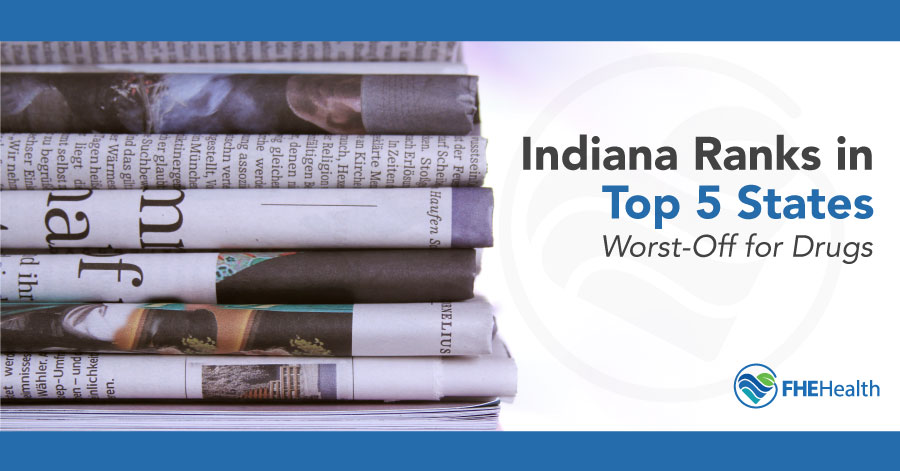
While there’s nothing remotely humorous about the nation’s drug epidemic and the suffering it encompasses, an Indiana sheriff’s office tried its hand at brevity by taking to social media with a post that encourages area drug dealers to effectively rat each other out. The “tongue-in-cheek Facebook post” was issued by the Jennings County Sheriff’s Department and included a form where drug dealers could write down the names and addresses of competing drug dealers as a means to “eliminate” the competition. As Indiana ranks the fifth-worst state in the country for drugs, it’s clear that humorous social media posts and memes will not solve this heartland state’s serious drug dilemma.
Jennings County in Profile
Jennings County does, of course, have a drug abuse problem within its jurisdiction. The Centers for Disease Control have ranked Jennings County as one of ten counties (out of 92) with the worst opioid drug problems. The opioid crisis in Indiana has caught the CDC’s attention because it is also associated with substantially higher risk for outbreaks of hepatitis and HIV. And opioids aren’t the only trouble for Jennings County. Just a few months back, law enforcement agents made 10 drug busts in under 24 hours; many of the arrests were associated with methamphetamine production and sales.
It’s an Indiana Problem
Of course, Jennings County isn’t the only area of the state combatting serious drug issues. The personal finance website WalletHub recently completed a study that determined that Indiana ranks fifth-worst state for drugs. The study, as reported by The New York Times, revealed dramatic news: “Indiana had 74 opioid painkiller prescriptions for every 100 people” and “the opioid epidemic has been giving way to a meth epidemic, as drug users search for a cheaper, less immediately deadly high.” According to the state government, “since 1999, the number of opioid poisoning deaths increased by 500%.” These statistics are unsettling, but in an earlier study, the state ranked seventh-worst state for the drug epidemic. For Indiana, the problem is getting worse—not better.
How Is the State Addressing the Crisis?
In April, legislators proposed a bill to create stiffer penalties for drug dealers and drug users, but lawmakers are still battling about the details of the enhanced charges. Back in 2018, the Indiana Commission to Combat Drug Abuse reported that the state is “making strides” to combat the drug crisis, but also stated that the state still needs to do better to “improve access to medication-assisted treatment.” Like many states, as one can see, Indiana is struggling to create a cohesive approach to the problem. Some factions stress instating harsh penalties. Others believe that access to treatment is where the focus needs to be.
Not Just a Legislative Problem
The state’s government and law enforcement officials aren’t the only ones struggling to improve Indiana’s dismal drug-abuse statistics. In another recent news report, a survey by the Indiana Workforce Recovery determined that “Less than half of Indiana employers have drug abuse policies directing workers to seek help.” It’s important for companies to have a drug policy for numerous reasons. For instance, companies should be outlining how to address situations where employees fail a drug test. In some cases, employees are fired, but are they always fired? If not, the company may be liable for preferential treatment.
Some state officials are now encouraging companies in Indiana to adopt ‘2nd chance programs” for employees who fail a drug screen. These companies could create a policy that provides employees with the option to retain their employment if they obtain drug treatment. Of course, Indiana does not have drug testing laws so many businesses in the state are looking to government to help provide a framework for addressing drugs in the workplace. The state’s common refrain: “we need to keep working on the issue.”
A Bright Spot?
Law enforcement officials in Indiana are hoping to curtail the problem by initiating school programs like the “Too Good for Drugs” program that is in place in Lake County area schools. It’s clear that many people who abuse drugs or alcohol begin to do so in their teenage years. So, the programs are actually targeting elementary school students with preventative solutions for helping them stay drug free. The programs provide students, schools, and families with resources they can turn to if they need help.
Fortunately, there is help available for people suffering with a substance abuse or addiction problem. FHE Health provides clients with a menu of treatment options. Some individuals require inpatient treatment while others may find that outpatient therapies meet their needs best. By customizing treatment for each individual, FHE Health delivers the customized care that help patients effectively manage their addictions—and achieve the long-term recovery they crave. If you or a loved one is suffering in Indiana or elsewhere in the country, consult FHE Health and learn more about their addiction recovery solutions.






